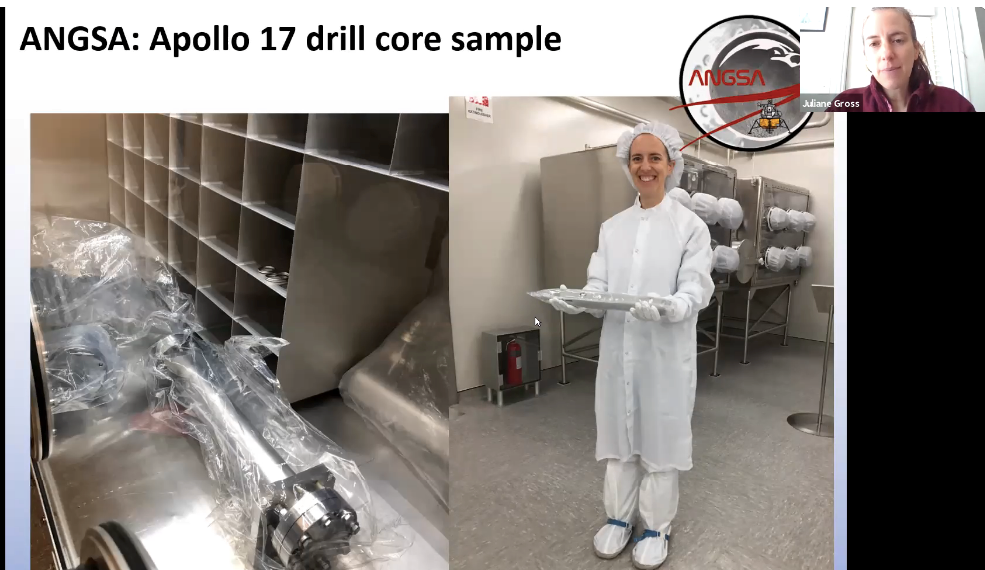
DUBOIS – As individuals around the globe adjust to new ways of working and learning during the COVID-19 pandemic, some Penn State DuBois students are taking advantage of real, out of this world learning opportunities right from their own homes.
Penn State DuBois’ Associate Professor of Mathematics and Geoscience Neyda Abreu has established a unique, multi-disciplined research group of undergraduate students that is connecting weekly with scientists from NASA and other organizations via Zoom.
“These students are part of my Planetary Sciences research group,” Abreu explained. “They are all engineering majors in fields of materials, aerospace and mechanical. They are very gifted in chemistry, which is why I invited them to work with me.”
Recently, students participated in a Zoom session with Dr. Juliane Gross, a NASA scientist at the Johnson Space Center in Huston, Texas, who opened the Apollo samples that had been sealed for nearly 50 years.
The lunar core samples can give scientists an up-close look at the makeup of the moon and a better understanding of the functions of the solar system.
Abreu’s own background lies in the study of the solar system. She has conducted extensive research into meteorites and their relationship to asteroids, including taking a six-week expedition in Antarctica to collect meteorite samples there that had fallen to Earth, earning her the National Science Foundation Antarctica Service Medal in 2011.
Abreu holds degrees in astronomy and physics, and a Ph.D. in earth and planetary sciences and has served as a NASA principal investigator. Her research interests include understanding early solar system chemistry through the observation of primitive meteorites.
Abreu was able to enlist the assistance of students in the Planetary Sciences research group to not only further groundbreaking research in the field, but also to provide incredibly valuable learning opportunities for those she’s teaching.
Even while dealing with the COVID quarantine, Abreu said innovation must move forward, and she was eager to find a way to keep offering the best educational opportunities possible for her students.
“Just because our bodies are at home, it doesn’t mean that our heads cannot be in space,” Abreu said. “Exploration demands good planning and a long view of safety.
“But it also reminds us that when we give the best of our knowledge and capabilities, we can overcome challenges that appear insurmountable.
“Exploration requires collaboration and teamwork, but it also teaches us that true individual freedom is the ability to define ourselves and chart our courses, no matter what our external circumstances might be. We need to be explorers of our Cosmos – of nature – more than ever.”
Her willingness to provide these opportunities is something Abreu’s students are grateful for and taking full advantage of.
Engineering major Dylan Treaster said the transition to remote learning has been much smoother than he could have imagined.
Treaster said, “When it was announced that we would transition to strictly remote learning, I was very concerned with my research as it is mostly hands-on work.
“However, switching to remote learning did not stop my research advisor, Neyda Abreu, who was able to set up virtual meetings via Zoom with people in fields related to our research.
“We have already met with a NASA curator from Johnson Space Center and a curator of meteorites who works at the Smithsonian National Museum of Natural History.
“I am very excited moving forward as she has more speakers planned. While we may not be able to work in labs, we can still obtain valuable information.”
While Treaster was skeptical at first, he went on to say that he’s even found additional bonuses to the current remote learning situation.
“The biggest advantage that I have found taking courses this way is that classes are now recorded, and the professors will send us the recordings after class,” Treaster said.
“This is a huge help if you had trouble understanding the material the first time, or if you had a conflict and couldn’t attend class, you are able to go back and obtain the notes.”
Abreu said finding a way to keep moving forward in the face of new challenges could be one of the greatest lessons in and of itself. She said, “Despite the daily grim reports, this is who we are.
“We are the people whose calling is creating science and technology breakthroughs that change lives, and that change how we see life.”
Abreu began teaching at Penn State DuBois in 2007. She is a member of an international research team with the Japanese Space Agency (JAXA), established to analyze material collected from asteroids during space missions.
She has published and edited multiple academic articles and books on her work with meteorites and asteroids.


